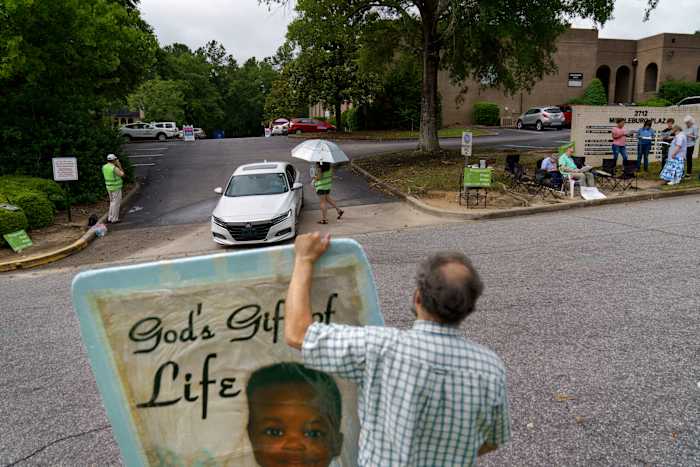
NHL, NHLPA close to agreeing on a new collective bargaining agreement, AP sources say
June 26, 2025
What to know about states blocking Medicaid funding for Planned Parenthood
June 26, 2025By upholding a South Carolina order that strips Medicaid funding from abortion providers, the Court abandoned both patient choice and the original civil rights vision behind Medicaid.
The Supreme Court delivered a stinging blow for basic healthcare on Thursday: In a 6-3 decision, along ideological lines, the Court allowed a harmful executive order from South Carolina Gov. Henry McMaster (R), originally signed in 2018, to stand. The executive order—part of an ongoing attack on reproductive freedom—allowed denying Medicaid funding to providers that deliver abortion services. The EO took aim at the state’s two Planned Parenthood clinics.
Medicaid funding is crucial for low-income Americans—it’s the vital thread that connects them with healthcare in a society where universal healthcare does not exist. It “provides health coverage to millions of Americans, including eligible low-income adults, children, pregnant women, elderly adults, and people with disabilities,” according to its official website.
However, many people are unaware of Medicaid’s origins.
The policy itself was a vital civil rights victory, and closely followed the Civil Rights Act of 1964 and the Voting Rights Act of 1965. Indeed, it is part of the largely untold story of President Lyndon Johnson and his civil rights New Deal legacy. Authorized in the Social Security Act, Medicaid was signed into law in 1965 by President Johnson.

It secured a major win for low-income Americans, who would not only get healthcare, but also be able to choose their doctors. This mattered as, prior to the law, racial discrimination in healthcare was an open secret. (Segregation also affected housing and education.) Blacks could be turned away from hospitals and clinics that refused to serve them, often sanctioned and permitted through state laws throughout the American South. The clever work of President Johnson and legislators was not only to create Medicaid, but also to provide patients with a choice of where they could use those state and federal dollars for healthcare services.
But Medina v. Planned Parenthood South Atlantic is not part of that civil rights legacy—it is a throwback to the chilling time before.
The case is part of the ongoing attack on reproductive freedom, which predates even Dobbs v. Jackson Women’s Health Organization, which overturned Roe v. Wade.
For decades, antiabortion advocates and elected officials have used targeted regulations of abortion providers—otherwise known as TRAP laws—to eliminate abortion through indirect means, creating financial ultimatums: Stop providing abortion services in order to receive funding for breast cancer screenings, prenatal care, postnatal care, ovarian cancer screenings and pregnancy testing for poor women … or lose critical funding. Both leave poor women in a lurch.
This Supreme Court decision weaponizes poor women’s poverty against them. In turn, it leaves clinics that wish to provide a full scope of healthcare unable to do so without a heavy financial or moral burden. South Carolina’s governor hoped to force healthcare providers to take the money and ignore the women who would need abortion care for miscarriages or other health issues—and that’s exactly what the Court allowed.
But, in doing so, the Court ignores legislative intent and the original framing of the law.
At its core, this case is about punishing providers—based not on the quality of services provided … or allegations of fraud, waste, abuse or harm to patients … or failure to meet the conditions and terms of the Medicaid program. Rather, it fits within a pattern of antiabortion lawmakers and governors seeking to weaponize their authority and overreach into constitutionally and federally protected spaces to deny not only abortion rights, but any other type of reproductive healthcare that they themselves personally disagree with.
In this case, the governor’s executive order to terminate Planned Parenthood and providers that perform abortions from the Medicaid program violated the free choice that patients are lawfully entitled to make under specific, decades-old Medicaid provisions.
The Supreme Court could have upheld the 4th Circuit’s decision that Medicaid beneficiaries may sue to enforce their “free-choice-of-provider” provision of Medicaid. In doing so, the Court would have preserved the integrity of the program, which itself emerged from the civil rights movement in the effort to protect Black patients who had historically been denied medical care and choice in states like South Carolina.
Instead, the Court struck down the 4th Circuit decision that the “any qualified provider” provision does not confer a private right upon a Medicaid beneficiary.
The decision continues the Court’s dismantling of civil rights and civil liberties by denying patients choice—a provision specifically written into the Medicaid Act, which was part of the historic legacy of the Johnson administration in rooting out discrimination in healthcare and expanding patient autonomy and choice.
Today, the Court exposed its selective and self-serving use of originalism—twisting history when convenient and ignoring it when not. This approach isn’t just hypocritical; it’s dangerous, and it’s already hurt millions of Americans.
!function(f,b,e,v,n,t,s)
{if(f.fbq)return;n=f.fbq=function(){n.callMethod?
n.callMethod.apply(n,arguments):n.queue.push(arguments)};
if(!f._fbq)f._fbq=n;n.push=n;n.loaded=!0;n.version=’2.0′;
n.queue=[];t=b.createElement(e);t.async=!0;
t.src=v;s=b.getElementsByTagName(e)[0];
s.parentNode.insertBefore(t,s)}(window,document,’script’,
‘https://connect.facebook.net/en_US/fbevents.js’);
fbq(‘init’, ‘200522034604820’);
fbq(‘track’, ‘PageView’);
Great Job Michele Goodwin & the Team @ Ms. Magazine Source link for sharing this story.








